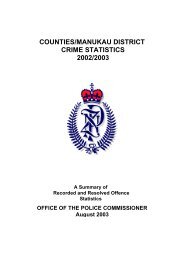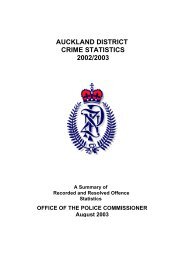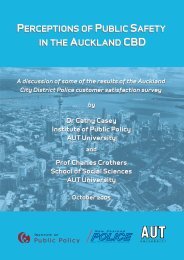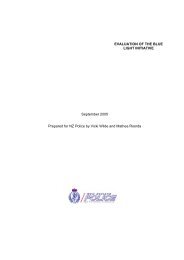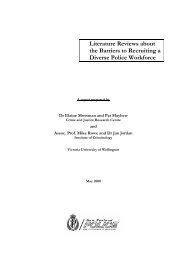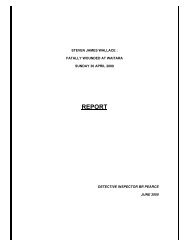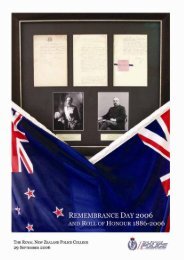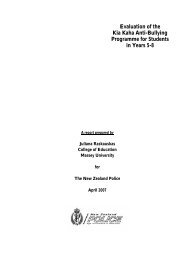Police Perceptions of Maori - Rethinking Crime and Punishment
Police Perceptions of Maori - Rethinking Crime and Punishment
Police Perceptions of Maori - Rethinking Crime and Punishment
You also want an ePaper? Increase the reach of your titles
YUMPU automatically turns print PDFs into web optimized ePapers that Google loves.
Introduction<br />
In New Zeal<strong>and</strong>, surveys <strong>of</strong> perceptions <strong>of</strong> the police show that <strong>Maori</strong> have less<br />
favourable views than non <strong>Maori</strong> (MRL, 1993, 1995a, 1995b). The 1995 MRL survey<br />
showed that most people, including most <strong>Maori</strong> respondents, had generally positive<br />
views <strong>of</strong> the police. On the other h<strong>and</strong> when the results for <strong>Maori</strong> <strong>and</strong> those <strong>of</strong><br />
European ancestry were compared, it was apparent that <strong>Maori</strong> were somewhat less<br />
likely to have favourable impressions <strong>of</strong> the police, to have trust <strong>and</strong> confidence in<br />
them, to see them as approachable or to be satisfied with the service they gave. <strong>Maori</strong><br />
were also less likely than those <strong>of</strong> European ancestry to report that the police deal<br />
impartially with all people regardless or race, class or gender <strong>and</strong> to investigate<br />
complaints against their own staff impartially <strong>and</strong> fairly.<br />
A number <strong>of</strong> other studies canvassing the views <strong>of</strong> <strong>Maori</strong> have also reported the<br />
general belief among <strong>Maori</strong> that the police behave more negatively towards <strong>Maori</strong><br />
<strong>of</strong>fenders (Workman et al cited in NZ <strong>Police</strong>/Te Puni Kokiri, 1997; Jackson, 1989; Te<br />
Tika Whainga, 1986). Jackson, for instance, refers to widespread <strong>Maori</strong> perceptions<br />
that police over-proscecute <strong>and</strong> harrass young <strong>Maori</strong> males. He cites allegations <strong>of</strong><br />
assaults in custody <strong>and</strong> humiliating treatment <strong>of</strong> <strong>Maori</strong> <strong>and</strong> suggests that the<br />
consequence <strong>of</strong> targeted policing strategies in particular areas is to amplify the amount<br />
<strong>of</strong> recorded crime among <strong>Maori</strong>. He suggests that both differential policing <strong>and</strong><br />
institutional racism are features <strong>of</strong> <strong>Maori</strong> experience <strong>of</strong> policing (pp 112-127) .<br />
Overseas research frequently points to negative attitudes, discriminatory behaviour <strong>and</strong><br />
racist abuse within the police towards ethnic minorities <strong>and</strong> indigenous peoples (Chan,<br />
1997; Gelsthorpe, 1993; Belsen, 1975). At the same time, the overseas studies show<br />
that ethnic minorities perceive the police negatively <strong>and</strong> as discriminatory (Smith &<br />
Gray, 1985; Reiner, 1994; Gelsthorpe, 1993).<br />
Within New Zeal<strong>and</strong>, there is a lack <strong>of</strong> empirical research on police attitudes <strong>and</strong><br />
perceptions <strong>of</strong> <strong>Maori</strong> or other minority or ethnic groups. One exception to this is a<br />
study by Dance (1987). He found that police perceptions <strong>of</strong> <strong>Maori</strong> were generally<br />
negative. However, using set narratives where the <strong>of</strong>fender was implied to be <strong>Maori</strong> or<br />
non <strong>Maori</strong>, Dance reported no significant differences in police decision-making. This<br />
finding, which contrasts with the observational studies from overseas, could be a result<br />
<strong>of</strong> methodological differences.<br />
The research reported here was designed to examine further police views on their own<br />
behaviour <strong>and</strong> attitudes to <strong>Maori</strong>. It aims to establish the extent to which police<br />
attitudes are likely to impact on police practice <strong>and</strong> aims to assess likely responses to<br />
the systemic changes in building responsiveness to <strong>Maori</strong> planned as part <strong>of</strong> Policing<br />
2000 (NZ <strong>Police</strong>, 1997).<br />
The most reliable <strong>and</strong> appropriate methods <strong>of</strong> assessing discriminatory behaviour<br />
involve observing police actions (as was done in London by Smith & Gray, 1985).<br />
However, such methods are costly. The alternative <strong>of</strong> surveying the police themselves<br />
using a postal questionnaire has been chosen here as one that is relatively economic<br />
<strong>and</strong> likely to provide useful information on the research questions. However, caution<br />
is necessary in relying on self reported behaviour <strong>of</strong> police as an accurate guide to what<br />
they themselves or others in the police service actually do.<br />
1



